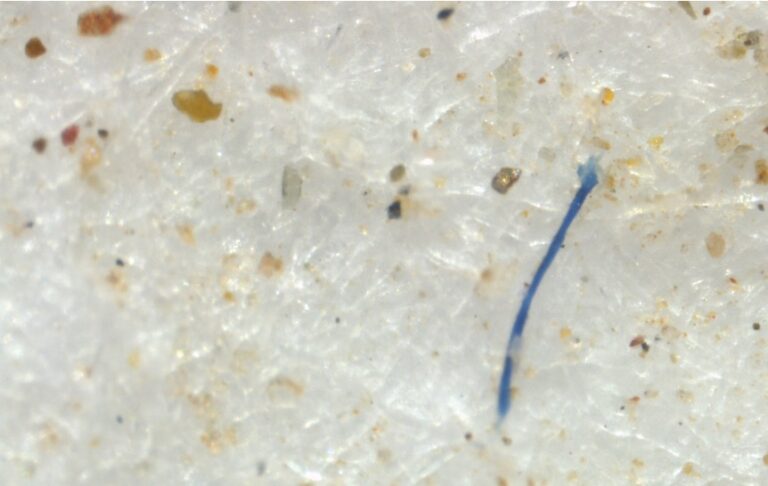Project Description
This multidisciplinary study aims to assess how different geological and oceanographic processes control the deposition of sediment and microplastics, and their control or influence on the benthic organisms living within deep marine sediments. Three key objectives will be addressed across a study area in the NE Atlantic Ocean: (1) Characterise the facies, sediment texture and benthic assemblages across different depositional environments and energy regimes influenced by alongslope ocean currents, downslope gravity flows and pelagic settling; (2) Identify the control of depositional environment on microplastic accumulation; and (3) Assess the influence of microplastics on benthic organisms and their activities.
99% of the global marine plastic budget is unaccounted for in known surface waste patches (Koelmans et al. 2017). It is therefore thought that large volumes of waste are accumulating in the deep ocean. However, little is known of the source to sink cycle of plastics in deep marine settings. Recent research shows sediments deposited by deep ocean bottom currents (named contourites) are potential hot spots for deposition (Kane et al. 2020) and it is hypothesised that contourite sediment drifts are the ultimate sink of microplastics in the ocean. Contourites are characterized by heavily bioturbated sediment, owing to the diverse benthos feeding off the nutrient-rich ocean currents that control their deposition. Burrowing organisms, combined with the elevated sediment accumulation rates typical of contouritic sediments provides an opportunity for rapid sequestration of microplastics into the subsurface.
This project will use earth and marine science methods to test the control of depositional environment on micro plastic accumulation and benthos in the deep ocean. The results will inform modelling on plastic distribution in the ocean basins and address the significant missing portion of the global plastic budget. It will also highlight if the influx of these artificial materials into the deep water are modifying benthic assemblages, and if so, which particle types are most damaging.
Research will be completed in the University of Aberdeen, with partners in Queens University Belfast. It builds on preliminary work completed by Brackenridge et al. (under review). Sediment samples will be analysed for: (1) composition (using XRF and smear slide analysis); (2) Organic content; (3) textural characteristics (sediment grainsize distribution using laser particle analyser); (4) sediment microplastic fraction and composition; and (5) benthic foraminifera assemblages. Sample analysis will be supplemented by core logging to determine the environment of deposition and intensity of sediment reworking and bioturbation. Results will be analysed using multivariant statistical methods and will be integrated into seabed geological mapping to define the present-day environment of deposition in the study area.
This multi-disciplinary project offers a unique opportunity to link modern and ancient systems in a high-impact research area. As such we are seeking a PhD candidate with excellent analytical and numeracy skills who works with a strong attention to detail. Previous experience in lab techniques is desirable. Training in analytical sedimentology and microbiology lab techniques will be provided in Aberdeen and Belfast. Data collection opportunities will be provided through visiting national and international core repositories, and ship-board time. As such the PhD candidate must be willing to travel.
CANDIDATE BACKGROUND
Essential Skills:
- A BSc in Geoscience, Environmental Science or equivalent
- Strong numeracy and analytical skills are essential for statistical analysis of textural, biological and microplastic particle results.
- A strong attention to detail is essential.
- The candidate must be willing to travel for data collection.
Desirable Skills:
- Previous experience in lab techniques, or a proven ability to learn is desirable, however training in analytical sedimentology and microbiology lab techniques will be provided.
- The candidate should be willing to disseminate research results thorough conferences and academic publications. As such, strong communication skills are desirable.
- Strong initiative and planning skills.
Photo credit: Rachel Brackenridge, UOA
Supervisors
Rachel BrackenridgePrimary Supervisor: | Profile: Rachel Brackenridge Email: rachel.brackenridge@abdn.ac.uk Institution: University of Aberdeen Department/School: School of Geosciences |
Patrick CollinsSecondary Supervisor: | Profile: Patrick Collins Email: Patrick.Collins@qub.ac.uk Institution: Queen's University, Belfast Department/School: School of Biological Sciences |
Adrian HartleyAdditional Supervisor: | Profile: Adrian Hartley Email: a.hartley@abdn.ac.uk Institution: University of Aberdeen Department/School: School of Geosciences |
References
Brackenridge, R.E., Schuettkus, M., Hartley A., Travers, J. under review. Evidence for depositional process control on microplastic accumulation in legacy deep marine sediment samples: an example from the Gulf of Cadiz contourite depositional system.
Kane, I.A., Clare, M.A., Miramontes, E., Wogelius, R., Rothwell, J.J., Garreau, P. and Pohl, F., 2020. Seafloor microplastic hotspots controlled by deep-sea circulation. Science, 368(6495), pp.1140-114
Koelmans, A.A., Kooi, M., Law, K.L. and Van Sebille, E., 2017. All is not lost: deriving a top-down mass budget of plastic at sea. Environmental Research Letters, 12(11), p.1140
QUADRAT Themes
- biodiversity
- earth-systems
- environmental-management






















































